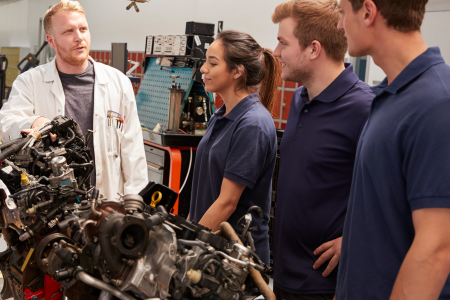How long does a pre-apprenticeship take?

What is a pre-apprenticeship?
A pre-apprenticeship is an introductory course that gives you an insight into a specific industry before committing to a full apprenticeship. It teaches you the fundamental skills of a trade to see if it is something you want to pursue. Pre-apprenticeships are usually Certificate II entry level training courses offered by TAFE. They are available to secondary students, school leavers and mature aged students seeking a new career path.
Difference between an apprenticeship and a pre-apprenticeship

The main differences between an apprenticeship and pre-apprenticeship are the length of time the course takes and the qualification on completion. Apprenticeships are courses that take about three to four years to complete and provide practical training combined with theoretical study. Once completed an apprenticeship is a recognised qualification for you to work in a particular trade. Apprentices are employed by a company and earn a formal qualification and receive on the job training towards being fully qualified in a trade or industry.
Pre-apprenticeships can prepare you for an apprenticeship. Unlike an apprenticeship, a pre-apprenticeship usually takes between three and nine months. You do not need to have the sponsorship of an employer to do a pre-apprenticeship and many students undertake pre-apprenticeships while at school or just after leaving to see what type of career appeals. A pre-apprenticeship gives you experience in the industry before making a commitment to an apprenticeship. Once completed, a pre-apprenticeship is usually a Certificate II qualification that can count towards a full apprenticeship in some cases.
Types of pre-apprenticeships and how long they take

There are a variety of different pre-apprenticeship courses from automotive and construction to cabinet making, engineering and electrotechnology. Each course offers an insight into a specialised field prior to committing to an apprenticeship. The course duration of each type of pre-apprenticeship varies. Pre-apprenticeships offered through South West TAFE are:
Certificate II in Automotive Vocational Preparation
If you are interested in improving your mechanical skills and finding out about a career in the automotive industry, this pre-apprenticeship course is ideal. The course teaches students through hands-on experience in the workshop. By the end of this pre-apprenticeship you will have learnt about mechanical components on vehicles, bicycles, marine craft and motorcycles. You will also know how to perform minor maintenance and servicing on vehicles.
- Course length: 15 weeks
- Entry requirements: Must be 16 years or older
- Qualification: Certificate II in Automotive Vocational Preparation
Certificate II in Building and Construction pre-apprenticeship
For those seeking a career in the construction industry, this pre-apprenticeship course will give you the insight into what it is like to be a builder. Students will learn the required skills for participating in building projects by helping to build a house from start to finish. During the course you will learn how to handle carpentry tools and equipment, how to interpret basic plans and how to construct a sub floor and wall frames.
- Course length: 28 weeks
- Entry requirements: Must be 16 years or older
- Qualification: Certificate II in Building and Construction
Certificate II in Cabinet Making and Timber Technology
If you are considering cabinet making as a profession, this pre-apprenticeship course may help you decide. The course provides you with the skills to use hand and power tools. You will learn about safety, timber joints and construction and how to operate woodworking machinery. Each skill taught in this course can lead to work in furniture making, cabinetry and basic building projects. It is an excellent pathway to an apprenticeship in cabinetry or other carpentry industries.
- Course length: 9 months
- Entry requirements: Must be 16 years or older
- Qualification: Certificate II in Cabinet Making and Timber Technology
Certificate II in Electrotechnology (Pre-vocational)
If you are interested in finding out about a career in electrotechnology, this pre-apprenticeship is perfect. The course provides training in basic electrical theory and gives insights into the type of careers involved in the electrotechnology industry. By the end of the course you will know how to safely solve problems in extra low voltage single path and multiple path DC circuits. You will be able to identify and select materials for electrotechnology work activities, learn how to use equipment and dismantle, assemble and fabricate electrotechnology components.
- Course length: 20 weeks
- Entry requirements: Year 10 minimum
- Qualification: Certificate II in Electrotechnology
Certificate II in Engineering Studies
This pre-apprenticeship course teaches engineering principles and offers hands-on experience in basic fabrication techniques, machining processes and welding. You will learn how to use computer-based technology programs to test and operate a multi-purpose robot. If you are considering a career in engineering, this course will teach you how to manage a project, operate machines safely and use design software. It could be the pathway to an engineering apprenticeship in the mechanical or fabrication trade.
- Course length: 15 weeks
- Entry requirements: Must be 16 years or older
- Qualification: Certificate II in Engineering Studies
Factors affecting pre-apprenticeship duration
The length of time a pre-apprenticeship may take depends on a number of factors like that type of trade and industry, whether it is part-time or full-time, and the course design. The main factors affecting pre-apprenticeship duration are:
- Type of trade: The length of time a pre-apprenticeship might take to complete could depend on the type of trade and how complex and demanding it is. A complex trade like plumbing or electrical work requires more extensive knowledge and skills which can take longer to learn. Some pre-apprenticeships for plumbers can take up to two years.
- Program structure: The structure of the pre-apprenticeship program will impact duration. Full-time or part-time study will affect the course length. Studying full-time usually shortens the course duration while part-time has the opposite effect. Some pre-apprenticeships, on the other hand, are designed as an accelerated introduction to a trade and can provide a shorter pathway to a full apprenticeship.
- Program requirements and deliverables: Certain program requirements and deliverables of a pre-apprenticeship will impact how long it takes. A program with more extensive practical training to master the material will typically take longer to complete. Students may need more work placement hours along with theoretical training to complete the pre-apprenticeship successfully.
Benefits of a pre-apprenticeship
Pre-apprenticeships offer a stepping stone to a full apprenticeship and skilled trade. These courses not only give students an insight into a trade, but also are more likely to lead to an apprenticeship with their pre-existing skills and knowledge. The benefits of completing a pre-apprenticeship are:
- Experience in the industry: A pre-apprenticeships gives you access and experience to an industry before you commit to a full apprenticeship. You get to try a trade to see if you like it.
- Don’t need an employer: With a pre-apprenticeship, you do the course as an independent person and do not need an employer to sponsor you.
- Learn new skills: With a pre-apprenticeship you learn new skills that you can use in daily life. This may be understanding how equipment works and how to maintain it properly.
- Communication skills: A pre-apprenticeship may help you to learn how to communicate with both clients, employers and fellow employees.
- Potential credits: There may be some credits for students who have completed a pre-apprenticeship course. A Certificate II can sometimes give you credit towards the apprenticeship.
- Better chance of an apprenticeship: After completing a pre-apprenticeship course, you have a better chance of getting an apprenticeship. Employers may look favorably on the course qualifications and skills you have already learned.
- No fees: Depending on eligibility, some pre-apprenticeship courses may be fee free under the Free TAFE program.
How long a pre-apprenticeship takes depends on the type of course, the trade and program structure. Some pre-apprenticeships may have a course duration of only two weeks while others can take up to two years. A pre-apprenticeship course teaches students what it is like to work in that trade prior to committing to a full apprenticeship. If you would like to find out more about pre-apprenticeships and how long they take, contact the team at South West TAFE.